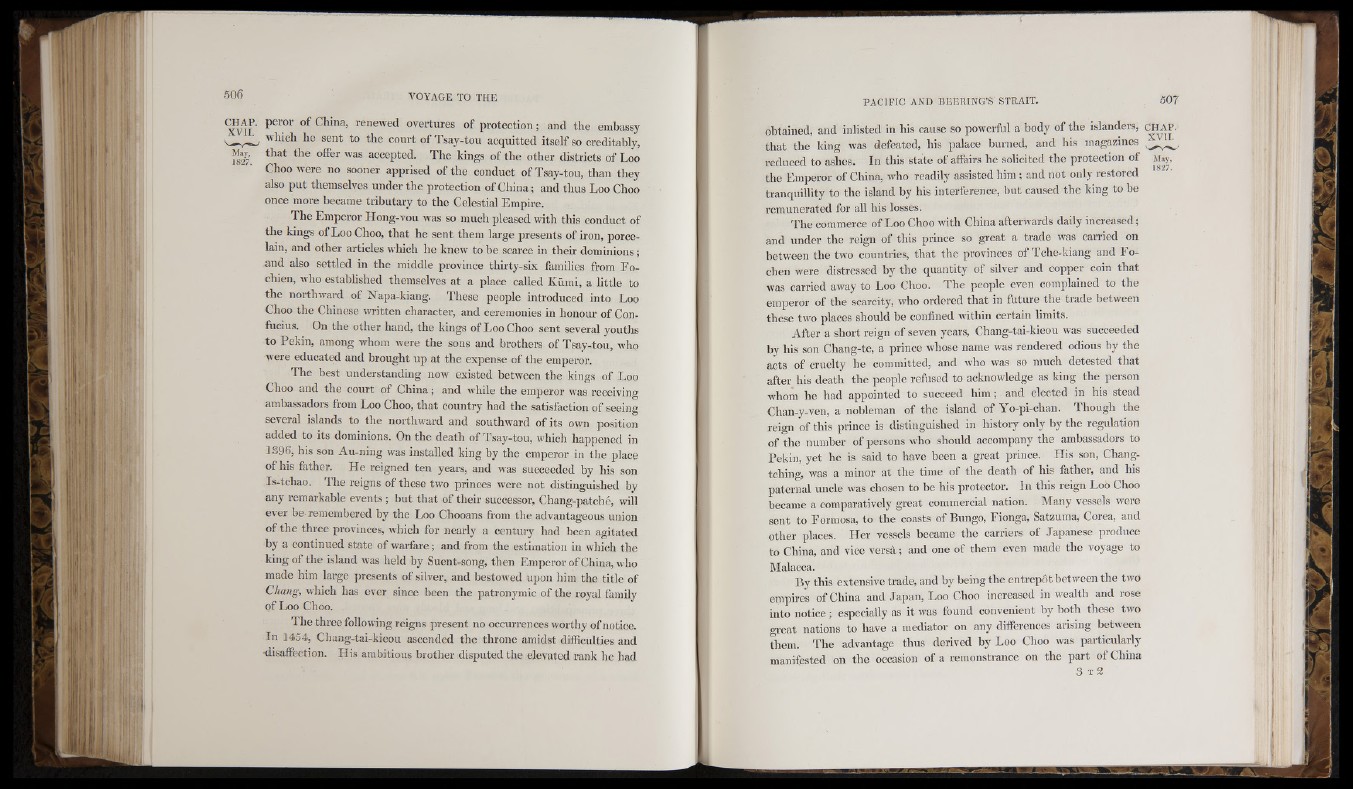
peror of China, renewed overtures of protection; and the embassy
, which he sent to the court of Tsay-tou acquitted itself so creditably,
that the offer was accepted. The kings of the other districts of Loo
Choo were no sooner apprised of the conduct of Tsay-tou, than they
also put themselves under the protection of China; and thus Loo Choo
once more became tributary to the Celestial Empire.
The Emperor Hong-vou was so much pleased with this conduct of
the kings of Loo Choo, that he sent them large presents of iron, porcelain,
and other articles which he knew to be scarce in their dominions;
and also settled in the middle province thirty-six families from Fochien,
who established themselves at a place called Kumi, a little to
the northward of Napa-kiang. These people introduced into Loo
Choo the Chinese written character, and ceremonies in honour of Confucius.
On the other hand, the kings of Loo Choo sent several youths
to Pekin, among whom were the sons and brothers of Tsay-tou, who
were educated and brought up at the expense c f the emperor.
The best understanding now existed between the kings of Loo
Choo and the court of China; and while the emperor was receiving
ambassadors from Loo Choo, that country had the satisfaction of seeing
several islands to the northward and southward of its own position
added to its dominions. On the death of Tsay-tou, which happened in
1396, his son Au-ning was installed king by the emperor in the place
of his father. He reigned ten years, and was succeeded by his son
Is-tchao. The reigns of these two princes were not distinguished by
any remarkable events ; but that of their successor, Chang-patche, will
ever be remembered by the Loo Chooans from the advantageous union
of the three provinces, which for nearly a century had been agitated
by a continued state of warfare; and from the estimation in which the
king of the island was held by Suent-song, then Emperor of Chinn, who
made him large presents of silver, and bestowed upon him the title of
Chang, which has ever since been the patronymic of the royal family
of Loo Choo.
The three following reigns present no occurrences worthy of notice.
In 1454, Chang-tai-kieou ascended the throne amidst difficulties and
disaffection. His ambitious brother disputed the elevated rank he had
llii. : '
obtained, and inlisted in his cause so powerful a body of the islanders, CTAR
that the king was defeated, his palace burned, and his magazines ; -----
reduced to ashes. In this state of affairs he solicited the protection of
M»y.
the Emperor of China, who readily assisted him ; and not only restored
1827.
tranquillity to the island by his interference, but caused the king to be
remunerated for all his losses.
The commerce of Loo Choo with China afterwards daily increased ;
and under the reign of this prince so great a trade was carried on
between the two countries, that the provinces of Tche-kiang and Eo-
chen were distressed by the quantity of silver and copper coin that
was carried away to Loo Choo. The people even complained to the
emperor of the scarcity, who ordered that in future the trade between
these two places should be confined within certain limits.
After a short reign of seven years, Chang-tai-kieou was succeeded
by his son Chang-te, a prince whose name was rendered odious by the
acts of cruelty he committed, and who was so much detested that
after his death the people refused to acknowledge as king the person
whom he had appointed to succeed him ; and elected in his stead
Chan-y-ven, a nobleman of the island of Y'o-pi-chan. Though the
reign of this prince is distinguished in history only by the regulation
of the nuniber of persons who should accompany the ambassadors to
Pekin, yet he is said to have been a great prince. His son, Cliang-
tching, was a minor at the time of the death of his father, and his
paternal uncle was chosen to be his protector. In this reign Loo Choo
became a comparatively great commercial nation. Many vessels were
sent to Formosa, to the coasts of Bungo, Fionga, Satzuraa, Corea, and
other places. Her vessels became the carriers of .Tapaiiese produce
to China, and vice versà ; and one of them even made the voyage to
Malacca.
By this extensive trade, and by being the entrepôt between the two
empires of China and Japan, Loo Choo increased in wealth and rose
into notice ; especially as it was found convenient by both these two
great nations to have a mediator on any differences arising between
them. The advantage thus derived by Loo Choo was particularly
manifested on the occasion of a remonstrance on the part of China
3 T 2
mS
A